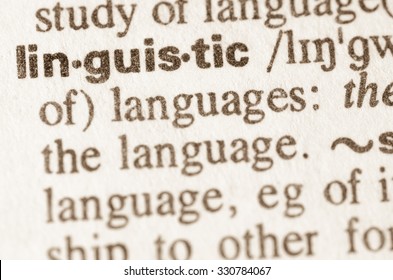

- #LINGUISTIC DICTIONARY ONLINE PDF#
- #LINGUISTIC DICTIONARY ONLINE UPDATE#
- #LINGUISTIC DICTIONARY ONLINE SERIES#
Agnes Korn (Frankfurt, now Paris) and Dr. Thanks to several (research and travel) grants from the Dutch Research Council (NWO), a number of renowned researchers were able to make important contributions to this project: Dr. Reconstructing Proto-Nostratic: Comparative Phonology, Morphology, and VocabularyĮtymological Dictionary of the Hittite Inherited LexiconĮtymological Dictionary of the Slavic Inherited LexiconĮtymological Dictionary of the Iranian Verbįor online access, please visit Indo-European Etymological Dictionaries Online. Robert Beekes (assisted by Lucien van Beek)Įtymological Dictionary of Latin and the other Italic Languages
#LINGUISTIC DICTIONARY ONLINE SERIES#
This has resulted in an indispensable, rich and voluminous (online) reference source: The Leiden Indo-European Etymological Dictionary Series 2014Įtymological Dictionary of the Baltic Inherited LexiconĮtymological Dictionary of Proto-GermanicĮtymological Dictionary of the Armenian Inherited LexiconĮtymological Dictionary of Greek (2 vols.) “It is a consistent theme of lexicography that great social change brings great linguistic change, and that has never been truer than in this current global crisis,” wrote Paton.Under the supervision of Sasha Lubotsky, an international team of linguists has researched, collected and integrated a growing corpus of linguistic data. Studying linguistic elements and the types of words in linguistics can help people better understand how words. The adjective “self-quarantined” was first used in 1878 to describe the actions of the villagers of Eyam in the 17th century, who isolated themselves to prevent the second wave of “Black Death” from spreading to surrounding villages. Linguistics is the systematic study of language.

Usage of “pestilence”, or “a fatal epidemic or disease”, first appears in 1382, not long after the bubonic plague peaked in Europe between 13. Previous pandemics have also given rise to new vocabulary. Now we all understand it as keeping a physical distance between ourselves and others to avoid infection,” wrote Paton. Social distancing, first used in 1957, “was originally an attitude rather than a physical term, referring to an aloofness or a deliberate attempt to distance oneself from others socially. The abbreviation PPE, for personal protective equipment, dates back to 1977 but was “formerly probably restricted to healthcare and emergency professionals”. The first noted usage of working from home was in 1995, but Paton notes that “the abbreviation was known to very few before it became a way of life for so many of us”. Collins is a major publisher of Educational, Language and Geographic content, and has been publishing innovative, inspiring and informative books for over 200 years. The OED’s lexicographers have noticed a rise in the use of specialist medical terms and new acronyms, such as WFH and PPE. “By March, the keywords reflect the social impact of the virus, and issues surrounding the medical response: social distancing, self-isolation and self-quarantine, lockdown, non-essential (as in non-essential travel), and postpone are all especially frequent, as are PPE and ventilator.” “In January, the words mainly relate to naming and describing the virus: coronavirus, SARS, virus, human-to-human, respiratory, flu-like,” said the OED in an analysis. By March every single word in the OED’s top 20 list of keywords – terms used significantly more frequently that month – was related to coronavirus. While back in December, words such as Brexit, impeachment and climate dominated news, by January, coronavirus was seeing significant use alongside current affairs terms such as bushfire, koala, Iraqi, locust and assassination.
#LINGUISTIC DICTIONARY ONLINE PDF#
The OED’s analysis of more than 8bn words of online news stories found that coronavirus and Covid-19, a shortening of coronavirus disease 2019, are now dominating global discourse. PDF On Jun 8, 2014, Mahdi Inaayah Kareem al-Utbi and others published The Guide: A Dictionary of Linguistic Terms, English- Arabic Find, read and cite. “But these are extraordinary times, and OED lexicographers, who like many others are all working from home … are tracking the development of the language of the pandemic and offering a linguistic and historical context to their usage.”


#LINGUISTIC DICTIONARY ONLINE UPDATE#
“As something of a departure, this update comes outside of our usual quarterly publication cycle,” said Paton.


 0 kommentar(er)
0 kommentar(er)
